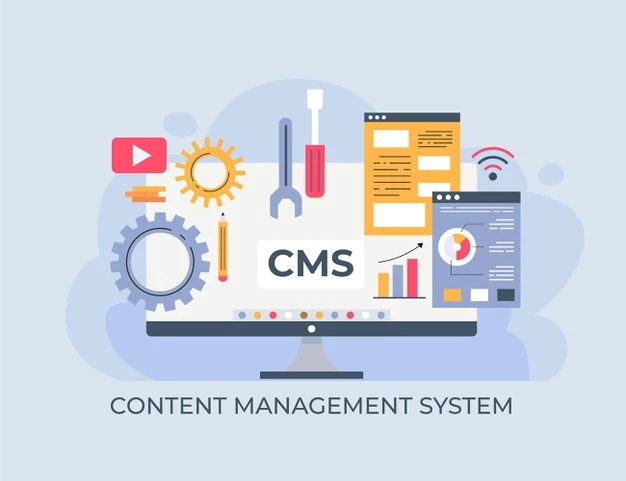CMS Website Services
What is a content management system (CMS)?
A content management system (CMS) is an application used to manage content, allowing multiple contributors to create, edit and publish. Content in a CMS is typically stored in a database and displayed in a presentation layer based on a set of templates like a website.
The following are common features of a CMS:
- Content creation, allows users to easily create and format content
- Content storage, stores content in one place, in a consistent fashion
- Workflows, assigns permissions for managing content based on roles such as authors, editors and admins
- Publishing, organizes and pushes content live

Benefits of a content management system
One significant advantage of a CMS is its collaborative nature. Multiple users can log on and contribute, schedule, or manage content to be published. Because the interface is usually browser-based, it can access a CMS from anywhere by any number of users.
The second significant advantage of a CMS is that it allows non-technical people who don’t know programming languages to create and manage their web content easily. The drag-and-drop editors of a typical content management platform will enable users to enter text and upload images without knowing any HTML or CSS (programming languages).
When a company uses a CMS to publish its web pages, it reduces its reliance on front-end developers to change the website, making it quicker and easier to print new web pages.
Popular Content Management Systems
While there are hundreds of CMS platforms, some of the more popular cms providers are listed below:
- WordPress
- Drupal
- Joomla
- Magento
- Squarespace
- Wix
Frequently Asked Questions
We have listed everything for our customers. Still, if you find any doubt, you can connect with us via Email or Social Media Network. Here are answers to some Frequently Asked Questions.
Most CMS platforms include basic website creation and content management features. These include: a WYSIWYG editor, web page layout templates and themes, content versioning and archiving, a publishing workflow, content scheduler/calendar, content tagging tools, and mobile optimization capabilities. More advanced CMS platforms may include more features aimed at managing content with complex structures across multiple webpages.
Yes, CMS products can be used to build an ecommerce website and manage site content (e.g. product catalog, product descriptions, images, etc..). If you’re planning on using your CMS to build and run an online store, here are a few must-have features:
- WYSIWYG editor
- Publishing tools
- Admin controls
- SEO marketing tools
- Deep website customization capabilities
- Social media & email marketing integrations
- A/B testing capabilities
- Analytics and reporting metrics
Many enterprise-scale CMS solutions require a price quote. For most CMS providers, pricing starts at $12 a month and can exceed $300 a month depending on their features. Free open-source software is available, as are free trials.
Content Management Systems facilitate the creation and publication of website content. They support website design and manage digital content including documents, text, images, audio, and video. eCommerce businesses, corporations, organizations, bloggers, and artists use CMS solutions to help build their websites.
These are some of the popular Content Management Systems (CMS) products.
- WordPress.org
- HubSpot CMS
- Drupal
- Squarespace
- Wix
- Joomla
- Magnolia CMS
- Shopify
- Magento
- BigCommerce
